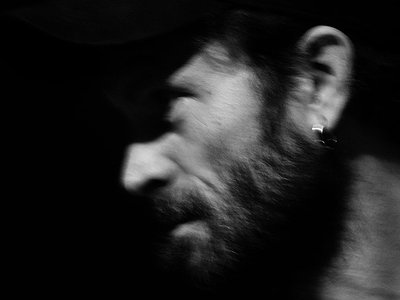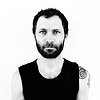Could you take us through a day in your life, from a possible morning routine through to your work? Do you have a fixed schedule? How do music and other aspects of your life feed back into each other - do you separate them or instead try to make them blend seamlessly?
I try to work as much as I can. Usually, after the daily morning tasks, I close myself in the studio and leave only to eat, listen to a record (if needed), or take care of other work-related duties. Any book I might be reading or movie/series I might be watching during a period influences me and shapes what I am doing. So, yeah, I think everything is related, mainly because I work simultaneously on several things - composing music for a particular band while mixing another record, researching, discovering other things that might lead to another composition. I like this way of spreading out material in front of my mind and progressing bit by bit.
Every aspect of my life and creative process influences one another. I enjoy making a puzzle out of pieces from “different boxes”. There’re always surprises and, to me, the final outcome makes total sense.
Could you describe your creative process on the basis of a piece or album that's particularly dear to you, please? Where did the ideas come from, how were they transformed in your mind, what did you start with and how do you refine these beginnings into the finished work of art?
What works for me is to “pamper” an idea for a long time, to have it turning in my head, even just by simply acknowledging it - knowing it is still there and keeping it there. Because in doing so, I will most likely find the way, time, and reason to do it. If I don’t, it won’t be a problem, as I have a lot of ideas already there and to come. This is particularly true when I do not work alone. For example, for a soon-to-be-released double LP called TREATMENTS , I had the idea for a long time of recording simple piano tracks to give to friends and to put some sounds on. I even recorded the tracks a couple of years before assigning them. The idea was so much in my mind that when Eiko, Jim, Joe, and Tatsuhisa sent me their contributions, I had a blast and experienced some of the most emotional moments ever, just listening to what they did! It was so great because even if I knew what to expect, the final result was waaaay better than I imagined. Of course, that has to do with “who” I asked to as well - top-notch creative and committed human beings.
There are many descriptions of the ideal state of mind for being creative. What is it like for you? What supports this ideal state of mind and what are distractions? Are there strategies to enter into this state more easily?
Oh no, it doesn’t work like that for me. I don’t think and don’t believe there is such a thing. For me, there is only the work and the commitment to it. Creativity can’t be “worked”; what can be worked is the work itself, and I don’t give importance to how things are made in art. For me, what counts is the result, even if sometimes I ask myself how a particular record/movie/project was conceived, both technically and in relation to one’s previous work. But if I like it, all the rest it doesn’t matter to me.
I like mysteriousness as it’s a(nother) “door” for me to see through this particular artist. Nowadays, especially because of social media and the madness of self-promotion (which, for me, is the antithesis of focused work), we are submerged by (personally speaking) useless concepts and words. I believe creativity is a personal thing, to be shared only via the medium I chose to deliver/present/manifest the work.
How is playing live and writing music in the studio connected? What do you achieve and draw from each experience personally? How do you see the relationship between improvisation and composition in this regard?
They are very different things. And since we are in the midst of the covid-19 crisis, it became clear to me that I enjoy both - or, better, that I am good in the studio, but before this mess, I didn’t know I was going to miss playing live SO much. Anyway, apart from this, for me, it depends on various factors. Touring with Akira Sakata in Japan, or playing solo piano concerts in Italy is absolutely fantastic, but playing live can be a bit of a drag.
I prefer to have time to work at my pace and without additional challenges… it’s a tricky question for the time being. As for the differences between composition and improvisation, for me there are none: I approach them exactly the same way. I’m not so much for "improvisation as instant composing", and “composing as well-thought improvisation”. For me it is not that simple, but I give them the same importance. If before I was much more into pure improv, now I like to choose the people I want to improvise with. I became quite picky on this.
How do you see the relationship between the 'sound' aspects of music and the 'composition' aspects? How do you work with sound and timbre to meet certain production ideas and in which way can certain sounds already take on compositional qualities?
This is an interesting subject. I love to get lost in a particular sound - it can be a chord on a piano, a particular instrument, or anything else that regards sound - and from there, if it makes sense, to build a structure, or a scaffold on which the embellishment of time can happen.
Building a structure solely from sounds is a very instinctive and direct way of musical composition, although I like also to start with an abstract idea (or not so abstract like in the case of Downtown Ethnic Music, I wanted to do my own “fourth world music” and pay tribute to Jon Hassell) and have the scaffold already in place before I make even one sound.
At the end, again, what counts for me it’s how it sounds: does it sound good? Then, I am satisfied with it.
Our sense of hearing shares intriguing connections to other senses. From your experience, what are some of the most inspiring overlaps between different senses - and what do they tell us about the way our senses work? What happens to sound at its outermost borders?
Yeah, those are interesting and weird things: I like dreamlike states combined with sound - or actual dreams and music. I dream a lot about music…I think the dream state, especially the hypnagogic state, is very “musical”, and sounds are felt and understood in a very different way when you are asleep or, mostly, in the sleep onset. I also like very much certain “physical” aspects of sound. You can almost touch it! It must do something very strange to your brain if it’s like that. I remember listening for the first time to Sheer Hellish Miasmah by Kevin Drumm - it was insane! I was touching the sound as much as you touch something with your hand, but it was my brain touching it. Amazing stuff. I approach music-making in a genuine and instinctive way, so these kind of examples come to mind quickly. I could talk about these topics ad infinitum.
Art can be a purpose in its own right, but it can also directly feed back into everyday life, take on a social and political role and lead to more engagement. Can you describe your approach to art and being an artist?
I don’t care what it means to be an artist, I only care about the work - my work and the work of the people I admire and love. I do not have any desire to describe myself as an artist or have intellectual flights to explain what art is. In this respect, I feel much more like a renaissance man, where even people like Michelangelo or Caravaggio were considered craftsmen and not artists. I mean, it’s cool to feel “touched by the Muses” and all that, but I personally like to be seen and heard for what I do, not what for who I am or what I represent. It’s like I said before about self-promotion - for me it’s all wasted time, in the real and most true sense of the word. If you are busy describing yourself and promoting yourself, you won’t have time to work, as time is limited.
It is remarkable, in a way, that we have arrived in the 21st century with the basic concept of music still intact. Do you have a vision of music, an idea of what music could be beyond its current form?
I see what you mean. Although, I do not have a vision of the music of the future, I am not so much about the here and now either. For me, major/minor chords still sound good, as does the most complex sound design in an electronic setting, or just intonation (here’s something rather nice: a very “old” way is coming back to life, and it makes music sound more “modern”…). I imagine there are different ways of how futuristic music could sound, and not necessarily related to technological progress or futuristic aesthetics. I am happy to be a witness to how things will progress, and of course, I'm curious about it.
Interviews / About
Fifteen Questions Interview with Giovanni Di Domenico
Like Minded
Part 2

"What works for me is to “pamper” an idea for a long time, to have it turning in my head, even just by simply acknowledging it - knowing it is still there and keeping it there. Because in doing so, I will most likely find the way, time, and reason to do it."


